- Home
- Laura Resnick
The Destroyer Goddess Page 14
The Destroyer Goddess Read online
Page 14
He nodded. "People who might feel what I felt when I first came here. Who might guess that it's not my power they're sensing, but something else that lives here."
"So Kiloran's never been here?"
"Certainly not while it's been my home. He may have come here long ago, for all I know, when Harlon lived here—though I doubt Harlon encouraged visitors, either. But Kiloran has no idea what's here, I'm sure of that. If he was ever here and felt anything, then he mistook it—"
"—for Harlon's power."
"Undoubtedly."
"You said Marjan lived here." Mirabar blinked at the way the chanting around them immediately changed to wailing.
"The Beyah-Olvari don't tell fond tales of Marjan. He was, I gather, not very kind their ancestors." He smiled and added, "He was a Guardian, you know."
"Once upon a time," she said. "Before he gave it up..." Mirabar looked around, her face changing as she realized the weight of what Baran was revealing to her today. "For this."
"Yes. For this." Even now, so full of bitterness, so near to death, he felt the seduction of water magic all around him. Baran wouldn't have given up love, not even for this. But fire? Absolutely. From the moment Marjan had found this, Baran doubted there'd been any question in his mind about which magic to consecrate his life to. Not if he felt what Baran always felt here. Not if he had the gift.
"So he didn't learn water magic by himself," Mirabar mused aloud, "by studying the paintings that the Beyah-Olvari left all over Sileria."
Baran grinned. "Of course not. I'm a very skilled waterlord, my dear, and I can't begin to decipher those things."
"He found them here," she looked around at the Beyah-Olvari, "when everyone thought they were already extinct, and he made them his slaves."
"He did, indeed. Then he built Belitar around them, to protect his secret from others, and to imprison the Beyah-Olvari here."
"And it's never occurred to you to let them go?" she asked, with obvious distaste for his character flaws.
"That was all a long time ago, Mirabar. They don't want to leave now. They don't know what's out there—apart from almost certain death, that is."
Her face took on a strange, thoughtful expression. "They don't know..."
Baran wondered what she was thinking. "Mirabar?" When she didn't respond, he prodded, "Mirabar."
She gathered her drifting thoughts. "What?"
"You're not to tell anyone about this." She didn't reply, so he prodded impatiently, "Do I have your word?"
"You forgot to threaten me," she pointed out.
He placed his hand over her belly, right where the Olvara had left a wet patch. "Do I need to?" Mirabar drew in a sharp breath, and he asked, "What did she tell you?"
"We're going to have a daughter," she said bluntly.
"But you just told me you're not—"
"I'm not. But we're going to have a daughter. And please," she added, "don't tell me you were praying for a son."
"I don't pray," he said. "Not anymore. Besides, no, I'm delighted. I much prefer girls. Boys are violent little war-mongering monsters."
"Are you quoting your own mother?" she asked dryly.
"Believe it or not, my mother doted on me." Baran paused, then asked, "Our daughter—is she this ruler you're supposed to find?"
Mirabar shook her head. "No. But he will need her. She will be born to shield him, as I was supposed to shield Josarian." She looked down, troubled and sad.
He toyed with the lava-rich curls that fell across her shoulder. "Josarian did what he was meant to do. You helped him achieve his destiny."
Her expression was bemused. "Baran, are you... trying to comfort me?"
He snorted, then realized that was indeed the case. "Old habits surface when you least expect them." He sighed. "I was, once upon a time, a good husband."
He glanced away from her uncertain expression when the chanting around them grew louder. The Olvara was returning to the cavern. She was dragging something behind her. It was a long, slim, and narrow object wrapped up in a darkly moldy cloth, and it was heavy enough to cause her to struggle.
Baran moved toward her, making a gesture to help her, but the Olvara stopped him. "No. You may not touch this. It is not for you. It has never been for you."
He blinked, then smiled wryly. Even in his illness, he was more powerful than the Olvara; but she was still his respected teacher, and he had done extraordinary things—such as marrying Mirabar—based on her guidance. So he shrugged and made no attempt to touch the object as she dragged it past him.
The Olvara was panting with exertion, her breath as fast as an excited puppy's, by the time she reached Mirabar's side with her mysterious burden.
"I have waited all my life," the Olvara told the Guardian, "for you to come and claim this. And before me, others guarded it. It has been here a long time, waiting for you."
Baran grinned when he saw Mirabar steel her expression as she accepted the moldily-wrapped offering.
"What is it?" his wife asked, looking as if even she found it a bit heavy.
"You'll understand when you unwrap it. No," the Olvara added, when Mirabar started to fiddle with the wrapping. "Not now."
"When?"
"Only you can know when."
Baran sighed, well accustomed to his teacher's vague and portentous comments. "How about giving us a hint, sirana?"
"When you are ready," the Olvara said to Mirabar.
Baran prodded, "A slightly more specific hint?"
The Olvara gazed up into Mirabar's face and said, "You will be ready to appreciate this gift when you are ready to protect what you most long to destroy."
Baran guessed from the way Mirabar flinched that this pronouncement meant something to her.
"Sirana," Mirabar said hesitantly. "Do you know who the Beckoner is?"
The Olvara only repeated, "A child of water, a child of fire."
"What about..." Mirabar looked down at the long, slender bundle in her arms. "A child of sorrow?"
"Yes!" The Olvara seemed exultant. "All of these things. They are the future, because they are the past."
"She's always this cryptic," Baran said apologetically to Mirabar. "I honestly wasn't sure if I was supposed to marry you or become a zanar."
Mirabar favored him with an irritable glance before saying, "Sirana, how will I—"
"When you are ready to protect what you most long to destroy," the Olvara repeated, "your path will unfold."
Chapter Eight
Do not laugh at the fallen;
there may be slippery places ahead.
—Moorlander Proverb
"Wyldon is dead," Dyshon reported to Kiloran. "It is done, siran."
"Good work," Kiloran said, staring out over the city of Cavasar from the tower window where he stood.
"His territory is now ours, siran."
"Yes, of course." Kiloran frowned, thinking.
"Siran?"
"Hmm?"
"I have carried out our plan and lost no men." When Kiloran didn't reply, Dyshon prodded, "You don't seem pleased, siran."
Kiloran finally gave his full attention to the green-eyed assassin who was still covered with dust from the road, having come straight to Kiloran upon returning to Cavasar. "You've done very well," Kiloran assured him, "and I am pleased. But disturbing news has preceded you." Kiloran turned away again and informed him, "Ferolen is dead. Tansen attacked a few nights ago, destroyed his stronghold, killed everyone, torched everything..." He shrugged and added, "Well, one assumes it was the Guardians who did the actual the torching. Ordinary fire could never have overcome Ferolen's power."
"That is..." Dyshon shuffled his feet. "Yes. That is distressing news, siran."
"And Baran has indeed betrayed us," Kiloran added.
"The Idalar River?"
"I can't get control of it. Not completely. So I can't get control of Shaljir."
"Baran must die."
"Yes," Kiloran agreed. "Baran must die."
It was very disappoin
ting. Kiloran had cherished high hopes when he sent that letter to Baran. Playing on Baran's wild emotionalism had worked occasionally in the past. Then again, Baran had always been, above all, unpredictable.
"Do you have new orders for me, siran?" Dyshon asked.
"Yes. In view of—"
Kiloran was interrupted by a knock at the door. An assassin came in, carrying a folded, sealed parchment. He was even dustier than Dyshon, and he looked even more tired and disheveled.
"A letter from Searlon, siran," he said.
"Ah." Kiloran took it from him, hoping for encouraging news.
The first few lines of the letter explained why Searlon had been out of touch longer than anticipated. The sea-bound Lascari had suffered severe losses to their numbers and were not easy to track down. Moreover, like so many sea-born folk these days, they were now bound for the waters off Sileria's eastern coast, right where the summit of Darshon was most visible from the sea, due east of the deserted shallah village of Gamalan. Like the rest of the east-bound sea-born folk, they couldn't say why they were going, they only knew they must go—and go so fast that Searlon had had trouble catching up with them.
However, he had indeed finally found them. And what they said about the boy Zarien was very surprising: He had died at sea during the bharata, the bloody dragonfish hunt which was an annual ritual of the sea-born folk. His clan seemed completely convinced of this. One of them had seen the jaws of a dragonfish close around the boy's torso, crush it, and pull his corpse into the depths of the blood-dark sea. Even if the beast had later let him go, the clan members all assured Searlon, there was no way he could have survived the attack. Whatever sea-born boy was now wandering the dryland, he was definitely not their Zarien, they said; it wasn't possible. There were presumably other sea-born boys named Zarien, ones who were not of the sea-bound Lascari, let alone dead; Searlon had merely come to the wrong clan. It was, after all, the sort of mistake a drylander would make.
Nonetheless, mindful of Kiloran's orders and slightly skeptical about any death which he himself did not witness, Searlon questioned Linyan—Zarien's grandfather and leader of the surviving clan members—very rigorously about the boy. The old man's initial story was that Zarien was the child of a now-dead Lascari couple, Sorin and Palomar. Searlon found this interesting, since he had already learned that was exactly who Tansen's young companion claimed his parents were. However, the old man's tale soon gave way, under the influence of stern persuasion, to a much more intriguing version of the boy's origins.
Kiloran sank slowly into a chair as he read Searlon's explanation, extracted from Linyan, about the presumed-dead sea-bound boy who was not only Tansen's constant companion but even, Searlon had recently learned...
"Tansen's bloodson," Kiloran read aloud, his heart pounding.
"Tansen doesn't have..." Dyshon drew in a swift breath. "He's taken a son?"
But Kiloran scarcely heard him. His thoughts were whirling in a chaos of shocked realization.
She didn't die in the mountains.
Alcinar had survived. She had lived to reach the sea. He had never believed it, had always thought she must have died on land. But, no, she had returned to her kind, even though they'd have shunned her, despised her, rejected her... She had returned to them because she knew she could convince them, in the end, to shelter the child she bore. And they had. Kiloran had never known, never suspected... Nor, it seemed, had Baran.
A child...
A child who would eventually come ashore—without his family's knowledge, it seemed, since they thought he was dead. A sea-bound boy who would desert the Lascari to walk the dryland, as his mother once had...
Why?
Did Baran know now, after all these years? Was that why he had betrayed Kiloran and violated the truce agreement?
If so, then why was the boy with Tansen, not Baran? And why not keep the boy at Belitar, which was virtually impregnable? Why let him wander war-torn Sileria with the shatai?
Why let him swear a bloodvow with Tansen?
Would Tansen want the boy, if he knew? Would Baran let Tansen keep him, if he knew? Was it possible...
By all the gods above and below...
Yes, Kiloran realized. It was possible. Even likely.
They don't know.
After all, who would have told them? According to Searlon's letter, the elderly Lascari clan leader said the boy himself had never known. Sorin and Palomar, who adopted him as their own after Alcinar died, had decided not to tell him until he was an adult.
The boy doesn't know.
He might suspect something—it might be why he had disappeared—but he didn't know the truth.
"Siran..." Dyshon ventured. "Have you had good news?"
He realized he was chuckling aloud. "Ah, Dyshon. To think only a few moments ago, I thought that learning of Wyldon's death would be the high point of my day."
"What does Searlon say, siran?"
Kiloran smiled broadly. "Searlon has discovered the most worthwhile thing of all."
"Siran?"
"A secret."
"Ah." Dyshon nodded. Everyone in Sileria understood the inherent value of a secret. "What will we do with it?"
"Searlon will pursue it. You will remain here in Cavasar, to rule the city in my absence."
Dyshon bowed his head and crossed his fists. "You honor me, siran."
"You," Kiloran said to the assassin who had brought Searlon's letter to him, "will return here tonight for my reply to Searlon, and you will leave Cavasar with it at first light."
"Of course, siran."
"And I..." Kiloran nodded. "Yes, I will leave Cavasar tomorrow."
There was a great deal to do. And the first task, of course, was to write detailed instructions to Searlon regarding Zarien.
Tansen must cherish the boy, to have made him his bloodson. If Tansen died protecting him, so much the better. And if not... Kiloran wondered which course of action would profit him more after capturing Zarien: Telling Baran who the boy really was? Or making sure that Tansen never guessed?
A bloodson...
Oh, yes, the shatai would even help Kiloran get control of the boy. Tansen had already given him the weapon he needed, long ago. And who could say for certain—perhaps it had always been meant to be this way?
Ah, it was wonderful when fate suddenly showed a man that he would indeed have everything he sought.
Standing in Baran's depressingly damp library at Belitar, Najdan watched Mirabar with dark concern. Ever since receiving this strange gift from Baran, wrapped in a moldy blanket that looked almost as old as Belitar itself, the sirana had seemed haunted, distracted, even tormented.
Mirabar didn't know what the gift was; and Baran, for reasons which remained unclear, was incapable of telling her. Prophecy had warned Mirabar not to unwrap the gift until she was ready. Mirabar seemed convinced that Sileria's fate relied on her being ready soon, yet she evidently had no idea how to become ready.
Najdan found it all very annoying.
Now, as Mirabar sat staring at the gift with such intensity that Najdan thought she might accidentally immolate it, the assassin silently cursed Baran again. The sirana had been under a terrible strain ever since marrying that madman and coming to this damp, gloomy, haunted place. Now Baran had abandoned her alone here at Belitar, having gone off on some mysterious task of his own. He had taken Sister Velikar and Vinn the assassin with him, as well as half a dozen others, effectively leaving Najdan in charge. Which was a strange position to be in, considering that Najdan had served Baran's worst enemy most of his life.
"Sirana," Najdan said. When she just continued to stare at Baran's gift with a fierce frown, he repeated more loudly, "Sirana."
Those glowing golden eyes shifted their gaze to him. "Hmm?"
"We've had news. A courier."
"From Baran?"
"No. From Wyldon's people."
That got her attention. "Well?"
"Wyldon is dead," said Najdan.
&n
bsp; "Dead? Is this Kiloran's doing?"
"That's what Wyldon's assassins believe, though it was supposedly a message from Baran which lured him to the meeting where he was ambushed."
Mirabar turned away from the moldy wrappings to focus on their conversation. "A message from Baran?"
Najdan unwrapped the small package which the courier had given him. Mirabar drew in a sharp breath when she saw the bracelet that matched the necklace which Baran had worn all these years.
She murmured, "That was from Kiloran, wasn't it?"
Najdan nodded. "I've seen it at Kandahar." He looked down at it now and shook his head. "But until it was brought here today, I never recognized the resemblance to Baran's necklace. Now it's so obvious that I..." He searched her gaze, wondering how much more she now knew about the secrets of those two giants than he did. "What exactly is between Kiloran and Baran?"
She folded her hands. "I'm sorry. I can only tell you if he gives me permission."
He nodded, respecting that. She had a husband now. Mirabar often seemed to both fear and despise Baran, but many people married without affection, and husbands and wives must honor each other's confidences.
"So," Mirabar guessed, "Wyldon's people want our assurances that Baran didn't kill him?"
"And then they want Baran to take over his territory before Kiloran can do it."
"I don't know if he can," she admitted.
Their eyes met. One secret Najdan did know, though they hadn't discussed it openly, was that Baran was dying. He had deteriorated enough, just since the marriage, that he couldn't hide this fact from anyone inhabiting Belitar.
"Even if he can," Mirabar added, "it might not be the wisest use of his remaining strength."
Najdan nodded. "Then perhaps you," he suggested, "could use your own power to keep Wyldon's territory from another waterlord?"
Her eyes brightened with interest for a moment, but then her face clouded. She looked again at the moldy gift that captured so much of her attention these days, and she ran a hand absently over her stomach. "Not me," she said at last. "I can't go there. We'll need to find someone else."
Najdan glanced down at her stomach. "How are you feeling?" he asked tactfully.

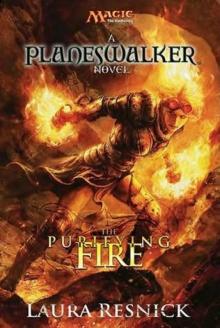 The Purifying Fire p-2
The Purifying Fire p-2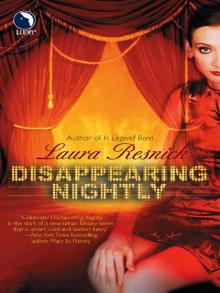 Disappearing Nightly
Disappearing Nightly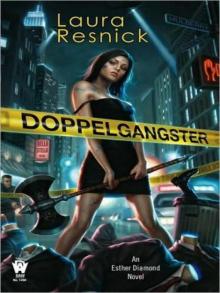 Doppelgangster
Doppelgangster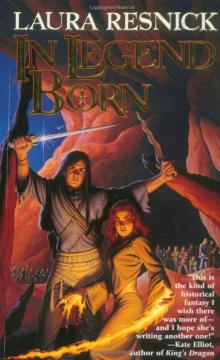 In Legend Born
In Legend Born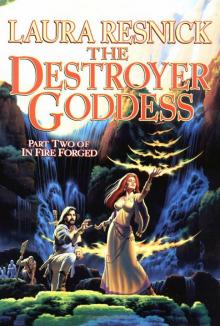 The Destroyer Goddess
The Destroyer Goddess The Purifying Fire: A Planeswalker Novel
The Purifying Fire: A Planeswalker Novel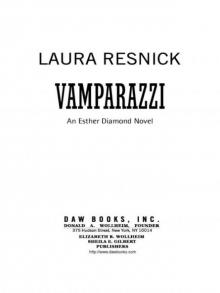 Vamparazzi
Vamparazzi A Wilder Name
A Wilder Name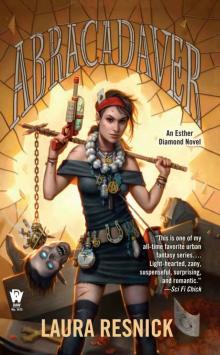 Abracadaver (Esther Diamond Novel)
Abracadaver (Esther Diamond Novel)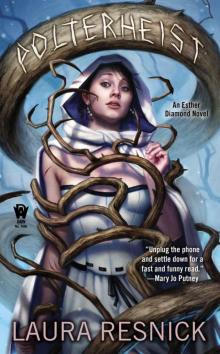 Polterheist: An Esther Diamond Novel
Polterheist: An Esther Diamond Novel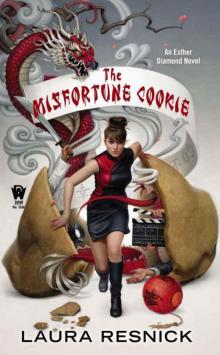 The Misfortune Cookie ed-6
The Misfortune Cookie ed-6 Fever Dreams
Fever Dreams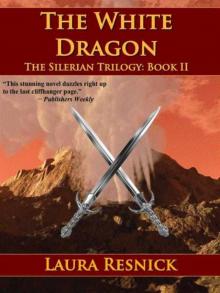 The White Dragon
The White Dragon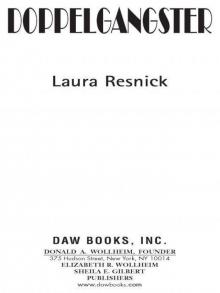 Dopplegangster
Dopplegangster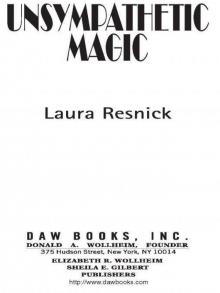 Unsympathetic Magic
Unsympathetic Magic